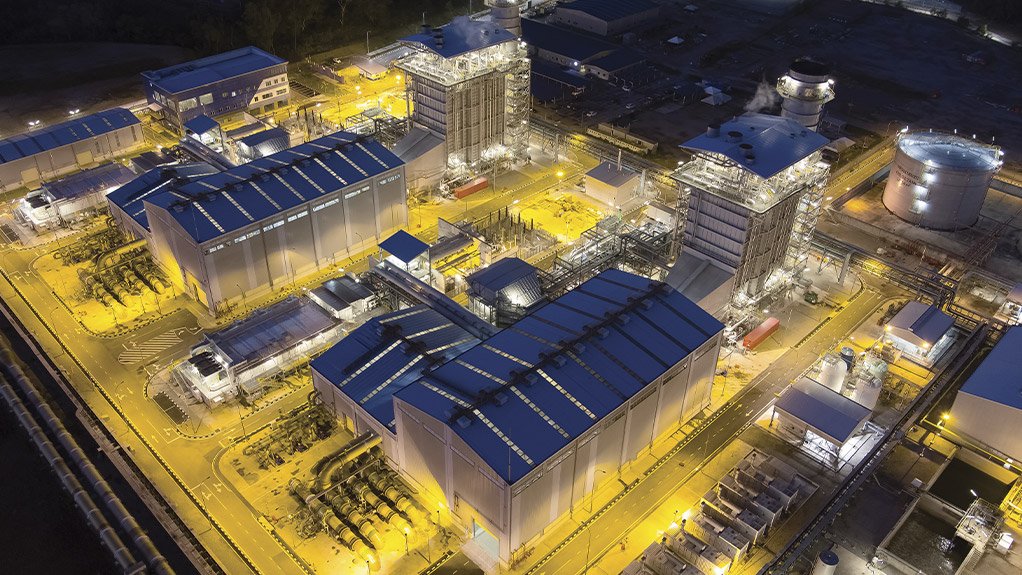Helping meet South Africa’s energy challenges with world record gas power technology
South Africa is striving to meet its energy needs. Increasing maintenance requirements on existing and ageing infrastructure, high levels of investment and capital required for new energy assets, along with social and economic implications for a Just energy transition, are among the reasons why state-owned utility Eskom has a crucial challenge to keep the country’s lights on.
Sustained periods of loadshedding have impacted the economy, reduced access to social services such as healthcare and education. The situation is particularly dire for those who cannot afford alternatives such as diesel generators, inverters or solar power.
The government has acknowledged that it needs a stable and reliable power supply if it is to transform the South African economy, spur re-industrialization and increase regional trade. President Cyril Ramaphosa recently appointed Dr Kgosientsho Ramokgopa as Minister of Electricity with a brief to reduce loadshedding and oversee government’s overall response to the energy crisis.
South Africa’s Integrated Resource Plan (IRP) outlines the country’s demand for electricity and how it will be met. Its objectives include making electricity inexpensive, reducing greenhouse gas emissions, reducing water usage and generating electricity from different sources. The South African government understands the country’s over-reliance on coal poses a risk to climate change and to meeting COP21 commitments. Coal accounts for 86% percent of the country’s energy mix and an ageing coal-fired fleet presents an opportunity for diversification. The country’s Just Energy Transition plan will ensure the move to a low-carbon energy future creates more opportunities for the communities that are likely to be impacted the most.
However, South Africa’s energy needs go beyond the short-term. The unbundling of Eskom’s generation, transmission and distribution entities will enable a competitive energy system that promotes increased investor participation. At the same time, there is an opportunity to address climate change – and the government expects new variable capacity, including 2.6 GW of solar and wind, to be added in accordance with the Renewable Energy Independent Procurement Programme (REIPPP).
The energy trilemma
GE believes a mixture of generation and grid solutions are needed to provide the balance between affordability, reliability and sustainability – and we believe that renewables and gas can combine powerfully to meet electricity needs and address the CO2 emissions challenge.
Research suggests South Africa’s energy mix will evolve to include greater amounts of renewables, even as coal remains the dominant fuel beyond 2040 according to the International Energy Agency (IEA). While renewables are the fastest growing source of new power generation, South Africa cannot rely solely on renewables to drive industrialization and economic growth, nor combat climate change. The pairing of gas and renewables offers compelling reasons to develop a new narrative that aligns with many successful coal-to-gas transitions.
Gas as a cleaner source of energy
Gas-fired power is a lower-carbon alternative to coal-fired generation, and its operational flexibility can help integrate variable renewables into the energy system. With large gas reserves in Mozambique, Angola, and other parts of southern Africa, gas power can enable greater renewables penetration and accelerate the retirement of coal assets.
The near-term impact of coal-to-gas switching could offer a fast and effective win for emissions reduction in South Africa but also delivers other benefits. With the country’s unemployment rate sitting at over 30 percent, large infrastructure projects could spur economic growth and create opportunities for jobs, new skills and industrialization. While there is no universal blueprint for implementing a coal-to-gas transition, many case studies exist from countries like Brazil, Poland, China and India that document the socioeconomic impact of transitioning to a greener economy.
Beyond the importance of infrastructure roll out for economic growth, other crucial considerations for South Africa’s gas programme include building partnerships between private and public sectors, finding sustainable solutions to funding shortfalls, and effectively implementing projects from beginning to end.
GE is uniquely positioned to play a leading role helping customers navigate the energy transition through its scale, breadth, and technological depth.
The 9HA.02 gas turbine
GE has the solution to help South Africa’s transition to a more sustainable and renewable future: the 9HA.02 gas turbine. With two world records for highest efficiency and over 1 million operating hours, the 9HA gas turbine is reliable, proven, hydrogen-capable and cost-effective. This powerful gas turbine can help keep the lights on and contribute to a healthier environment for the people of South Africa for many years to come.
The 9HA.02 gas turbine can run on a variety of liquid and gaseous fuels, including fuels that contain hydrogen, making them ideal to meet current and future decarbonisation needs.
Specific benefits include:
- Lowest emissions of any gas turbine in the industry
- Higher flexibility with reduced minimum environmental load to parking mode
- Highest combined-cycle efficiency in industry
- Modular configuration that reduces installation and cost
- Tried and tested technology
- Hydrogen-ready gas turbines
- Simple air-cooling architecture for easy plant integration.
GE’s 9HA high efficiency, air-cooled gas turbine is one of the industry leaders among H-class offerings, and now the 9HA gas turbine is at the heart of the world’s most efficient combined-cycle power plant.
Coal-to-gas transition: making it happen in Brazil
Coal-to-gas switching by retiring old coal-fired capacity and replacing it with new, high efficiency combined cycle capacity offers massive potential to combat climate change. Natural gas-fired generators have the lowest CO2 emissions of all fossil power generation fuels, and GE’s H-Class gas turbine portfolio can burn up to 50% by volume of hydrogen when blended with natural gas, offering a future pathway for even lower or near-zero carbon operations.
As Brazil’s demand for energy continued to grow rapidly, it became critical for the country to diversify its energy matrix, as well as make it more efficient. Brazil is reliant on hydropower for around 75% of its electricity and the rule of thumb is that the more it rains, the less Brazil needs to burn coal, oil and gas — and vice versa. So when the giant reservoirs in Brazil’s southeast and central-western regions threaten to run dry, as happened frequently in the past, gas power rises to the challenge. The Porto de Sergipe combined-cycle gas power plant, with a generation capacity of 1,516 MW, is the largest natural gas power plant in Latin America, and capable of meeting up to 15% of the energy demand in Northeast Brazil alone.
The road ahead
South Africa urgently needs affordable, reliable and sustainable energy, and needs the right power capacity mix to bridge the gap between demand and supply and support the energy transition—and ultimately provide a decarbonized energy future with a mix of LNG, gas, renewables and energy storage. South Africa’s ageing coal-powered fleet represents the ideal opportunity to craft a new path forward pairing gas and renewables, and leveraging the best-case examples of others – such as the Sergipe plant – which have successfully helped the country to transition from coal-to-gas.
Article Enquiry
Email Article
Save Article
Feedback
To advertise email advertising@creamermedia.co.za or click here
Press Office
Announcements
What's On
Subscribe to improve your user experience...
Option 1 (equivalent of R125 a month):
Receive a weekly copy of Creamer Media's Engineering News & Mining Weekly magazine
(print copy for those in South Africa and e-magazine for those outside of South Africa)
Receive daily email newsletters
Access to full search results
Access archive of magazine back copies
Access to Projects in Progress
Access to ONE Research Report of your choice in PDF format
Option 2 (equivalent of R375 a month):
All benefits from Option 1
PLUS
Access to Creamer Media's Research Channel Africa for ALL Research Reports, in PDF format, on various industrial and mining sectors
including Electricity; Water; Energy Transition; Hydrogen; Roads, Rail and Ports; Coal; Gold; Platinum; Battery Metals; etc.
Already a subscriber?
Forgotten your password?
Receive weekly copy of Creamer Media's Engineering News & Mining Weekly magazine (print copy for those in South Africa and e-magazine for those outside of South Africa)
➕
Recieve daily email newsletters
➕
Access to full search results
➕
Access archive of magazine back copies
➕
Access to Projects in Progress
➕
Access to ONE Research Report of your choice in PDF format
RESEARCH CHANNEL AFRICA
R4500 (equivalent of R375 a month)
SUBSCRIBEAll benefits from Option 1
➕
Access to Creamer Media's Research Channel Africa for ALL Research Reports on various industrial and mining sectors, in PDF format, including on:
Electricity
➕
Water
➕
Energy Transition
➕
Hydrogen
➕
Roads, Rail and Ports
➕
Coal
➕
Gold
➕
Platinum
➕
Battery Metals
➕
etc.
Receive all benefits from Option 1 or Option 2 delivered to numerous people at your company
➕
Multiple User names and Passwords for simultaneous log-ins
➕
Intranet integration access to all in your organisation




















